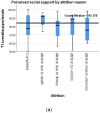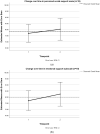Feasibility of Patient Reported Outcome Measures in Psychosocial Palliative Care: Observational Cohort Study of Hospice Day Care and Social Support Groups
- PMID: 36293835
- PMCID: PMC9603547
- DOI: 10.3390/ijerph192013258
Feasibility of Patient Reported Outcome Measures in Psychosocial Palliative Care: Observational Cohort Study of Hospice Day Care and Social Support Groups
Abstract
Palliative care patients can be at risk of social isolation or loneliness. Interventions that can provide effective social support, and particularly emotional support, could facilitate healthy coping that bolsters quality of life and reduces depression in palliative care patients. This is an observational cohort study which recruited thirty patients (n = 30) from the day services of four independent hospices in England. Participants completed patient reported outcome measures in perceived social support, loneliness, and depression, at up to three time points. Age range was 56-91 years, males and females were equally represented, and the sample was 93% white British. In participants that provided two or more timepoints, perceived social support increased, and loneliness and depression decreased. Largest changes with the least variation between participants was in emotional support (p = 0.165) and loneliness (p = 0.104). These results suggest that the psychosocial patient reported outcome measures used (MOS-SS, UCLA, BEDS) could be sensitive to change aligned with the goals of this intervention in palliative care. Participants in this study were observed to derive psychosocial benefit from attending the hospice day service.
Keywords: hospice day care; palliative care; patient reported outcome measures; social support.
Conflict of interest statement
The authors declare no conflict of interest. The funders had no role in the collection, analyses, or interpretation of data or in the writing of the manuscript.
Figures





Similar articles
-
Explaining how and why social support groups in hospice day services benefit palliative care patients, for whom, and in what circumstances.Palliat Care Soc Pract. 2023 Dec 2;17:26323524231214549. doi: 10.1177/26323524231214549. eCollection 2023. Palliat Care Soc Pract. 2023. PMID: 38044931 Free PMC article.
-
A survey of hospice day services in the United Kingdom & Republic of Ireland : how did hospices offer social support to palliative care patients, pre-pandemic?BMC Palliat Care. 2022 Oct 5;21(1):170. doi: 10.1186/s12904-022-01061-9. BMC Palliat Care. 2022. PMID: 36195870 Free PMC article. Review.
-
Palliative care experiences of adult cancer patients from ethnocultural groups: a qualitative systematic review protocol.JBI Database System Rev Implement Rep. 2015 Jan;13(1):99-111. doi: 10.11124/jbisrir-2015-1809. JBI Database System Rev Implement Rep. 2015. PMID: 26447011
-
Palliative care organization and staffing models in residential hospices: Which makes the difference?Int J Nurs Stud. 2022 Feb;126:104135. doi: 10.1016/j.ijnurstu.2021.104135. Epub 2021 Nov 13. Int J Nurs Stud. 2022. PMID: 34923319
-
Objectifying the Subjective: The Use of Heart Rate Variability as a Psychosocial Symptom Biomarker in Hospice and Palliative Care Research.J Pain Symptom Manage. 2021 Sep;62(3):e315-e321. doi: 10.1016/j.jpainsymman.2021.04.015. Epub 2021 Apr 29. J Pain Symptom Manage. 2021. PMID: 33933615 Free PMC article. Review.
Cited by
-
iLIVE volunteer study: Volunteer and healthcare professional perceptions of newly developed hospital end-of-life-care volunteer services, in five countries.Palliat Med. 2025 Jul;39(7):792-802. doi: 10.1177/02692163251328197. Epub 2025 May 29. Palliat Med. 2025. PMID: 40438981 Free PMC article.
-
Explaining how and why social support groups in hospice day services benefit palliative care patients, for whom, and in what circumstances.Palliat Care Soc Pract. 2023 Dec 2;17:26323524231214549. doi: 10.1177/26323524231214549. eCollection 2023. Palliat Care Soc Pract. 2023. PMID: 38044931 Free PMC article.
References
-
- Hospice UK . Hospice Accounts Report. Hospice UK; London, UK: 2018.
Publication types
MeSH terms
Grants and funding
LinkOut - more resources
Full Text Sources
Medical

